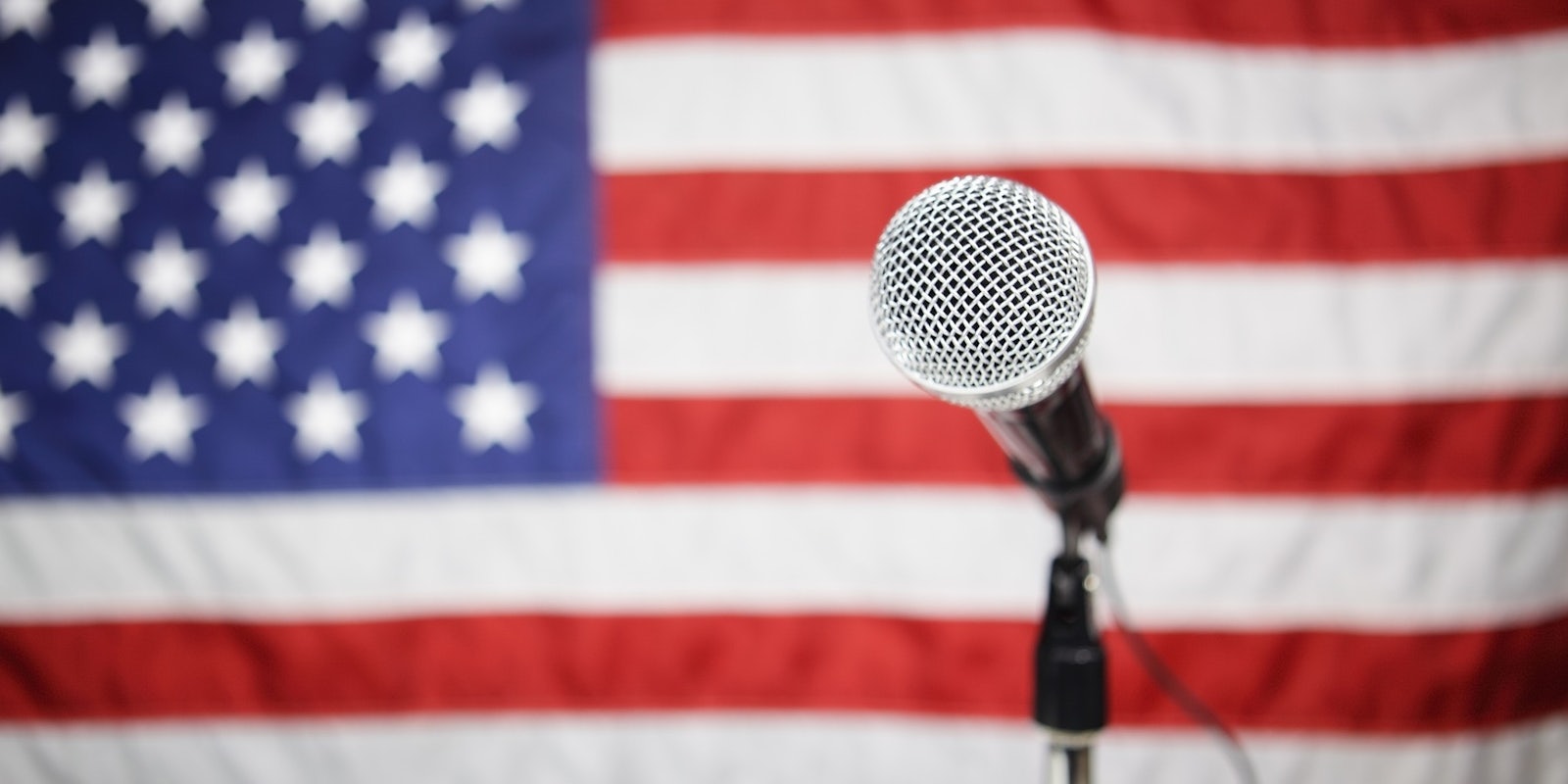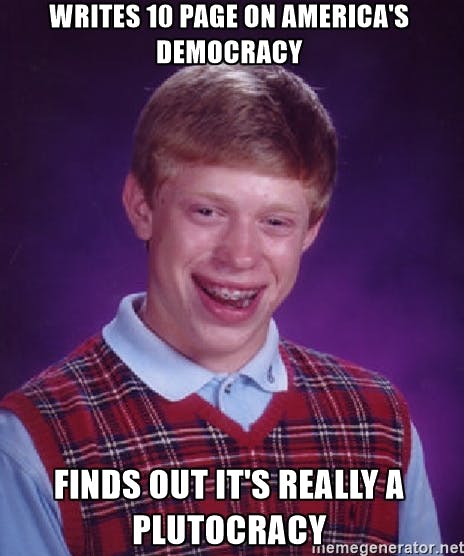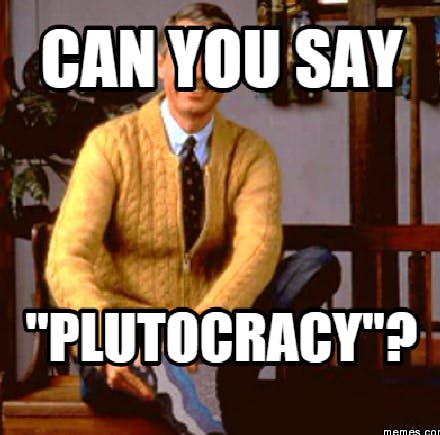You’ve likely seen the term “plutocracy” tossed around the internet a lot in 2016.
It’s no surprise. From Donald Trump‘s rise to Hillary Clinton courting Silicon Valley billionaires to Wells Fargo being fined $185 million for five years of misleading consumers, this year has been defined by economic elites coming out on top.
The presidential campaign of Sen. Bernie Sanders (I-Vt.) was fueled by his promises to tackle corporate greed, income inequality, and overturn the 2010 Supreme Court decision Citizens United. Many saw Sanders’s loss of the Democratic presidential nomination as a victory for the plutocracy. (Political commentator Bill Moyers, scholar Noam Chomsky and many others have declared that the America we live in today is not a democracy, but in fact a plutocracy.)
The internet is ridden with plutocracy memes, many of which have proliferated this year in light of the presidential election.
But what exactly is a plutocracy, and what does it mean to be a plutocrat?
The Oxford English Dictionary offers these definitions for plutocracy:
1. Government by the wealthy.
2. A country or society governed by the wealthy.
3. An elite or ruling class of people whose power derives from their wealth.
If a plutocracy is a government ruled by the wealthy, then it makes sense that plutocrats are the wealthy. What makes you wealthy in America? If you’re going by Internal Revenue Service standards, an annual income of over $415,050 dollars as a single person or $466, 950 dollars as a married couple puts you in the top tax bracket for 2016. To be officially a part of the “1 percent” of income earners, you’ll need $428,713 of adjusted gross income in 2016.
But the doctors and lawyers and other working professionals earning upward of $400 grand a year are a far cry from those like hedge fund owner Ray Dalio, whose personal worth is an estimated $154 billion. Yet they share the same tax bracket.
Many consider the “real” plutocrats to be the venture capitalists and financial chieftains with enough money to sway politics. Some examples of people considered to be plutocrats include Warren Buffet (though he calls its a “bad trend“), PayPal founder Peter Thiel, and the Koch brothers.
“It is no surprise that there is an increased interest in the term… given the outsized role of money in our elections,” wrote Professor Richard L. Hasen, the author of Plutocrats United: Campaign Money, the Supreme Court, and the Distortion of American Elections in an email to the Daily Dot.
The 2010 landmark Supreme Court ruling known as Citizens United all but eliminated federal spending limits on corporate campaign contributions and drew the rise of super-PACs. Instead of contributing directly to candidates (which is limited by federal law), individuals could contribute as much as they wanted to a candidate’s super-PAC. Outside spending on Senate elections alone doubled from 2010 to 2014, which also included the $74 million Silicon Valley tech billionaire Tom Steyer unsuccessfully spent to try and prevent the Senate from switching power in 2014.
Is Trump a plutocrat? The Republican presidential nominee’s refusal to release his tax returns has cast doubts on whether he is really worth the $4.5 billion estimated by Forbes. Journalist Timothy O’Brien , who actually saw his tax returns, estimated in Bloomberg that Trump’s income is as low as $150 million-$250 million (O’Brien was subsequently sued.)
Interestingly enough, Clinton has benefited more from Citizens United than Trump. Trump relied on self-funding his campaign until it became impossible to sustain his operations. A total of $40 million has been raised by outside groups on behalf of Trump as of Sept. 21, according to Open Secrets. Compare that to the $143 million that has been raised by pro-Clinton outside groups.
In fact, Bloomberg found out this month that Clinton outraises Trump in terms of billionaires by 20 to 1. Many Republican billionaires, most notably the Koch brothers, have refused to back Trump.
Trump has been a vocal critic of Citizens United; he campaigned against the influence that big money had on politics. Trump recently decided to make Citizens United president David Bossie his deputy campaign manager in September. Yahoo News reported earlier this month that a Trump charity donated more than $100 grand to the Citizens United foundation in 2014.
“Trump has a lot of supporters of lower-educated, poorer whites. The populist message against plutocrats resonates with them, even if it is coming from a very wealthy individual,” wrote Hasen to the Daily Dot.
The Daily Show‘s Trevor Noah lambasted a 1999 New York Times op-ed by Trump in which he decried politicians who said they grew up poor.
Wrote Trump:
“There’s a perception that voters like poverty. I don’t like poverty. Usually, there’s a reason for poverty. Do you want someone who gets to be president and that’s literally the highest paying job he’s ever had?”
But whether Trump is a PINO (Plutocrat in Name Only) or not is beside the point. Wealth is more concentrated in America in 2016 than ever before in its history, and much of that happened over the past two decades—the last of which included a recession.
Moyers says as much on his blog:
Since 1980, the economy has continued to grow impressively, but most of the benefits have migrated to the top. In these years, workers were more productive but received less of the wealth they were helping to create. In the late 1970s, the richest 1 percent received 9 percent of total income and held 19 percent of the nation’s wealth. The share of total income going to that 1 percent would then rise to more than 23 percent by 2007, while their share of total wealth would grow to 35 percent. And that was all before the economic meltdown of 2007-08.
Fans of trickle-down economics may find their feathers a bit ruffled. Is more wealth necessarily a bad thing? A U.S. Census Bureau report released this month showed that Americans at nearly every income level saw a nearly 5 percent increase to their incomes in 2015, and median household income increased for the first time since before the recession. Good news, right?
Not exactly. Many pointed out that the most recent Census report disguises some darker truths; income inequality between white and black Americans is worse today than it was in 1979, and unemployment for high school graduates is almost 20 percent—that’s five points worse than it was in 2007.
Wealthy people—either because of their ability to contribute to campaigns or get involved with politics to begin with—are found to have a disproportionate impact on policy. A 2015 study from political scientists William Franko and Patrick Flavin found that the poor and the rich have different policy priorities, and state legislatures are far more likely to focus on the priorities of the rich than the priorities of the majority of their constituents. State legislatures were found to be more likely to focus on issues like immigration, abortion, and poverty when those issues were prioritized by rich people.
Both a majority of Democrats and Republicans agree that income inequality and poverty is on the rise, according to a 2014 Pew poll. Republican and Democratic politicians have re-tooled their campaigns this year accordingly. The rise of Sanders proved that issues like raising the minimum wage and closing the wealth gap could stir crowds. The Koch Brothers even created an “End the Divide” ad campaign, with the goal of attacking poverty.
But the nomination of Trump pushed the national debate in an entirely different direction, noted political scientist William Franko in an email to the Daily Dot.
Instead of focusing on poverty or closing the wage gap, much of the media coverage of Election 2016 has been about trying to understand Trump. Specifically, how a major U.S. political party nominated a candidate whose campaign is largely based on what Franko says are “explicit and/or implicit appeals to nationalism, racism, and other prejudices.” Journalists, meanwhile, have had the challenge of covering a candidate who regularly distorts the truth.
“I don’t think this means that economic and political inequities aren’t relevant to the election. I believe they are. Rather, these issues have been less salient as a result of this very unusual presidential candidate,” wrote Franko.
Meanwhile, the rich are getting richer.


